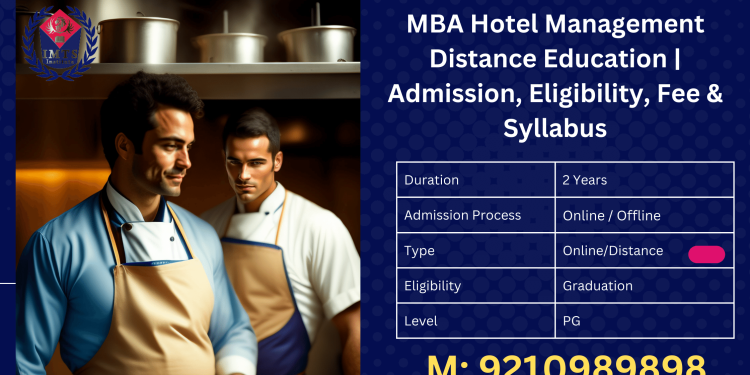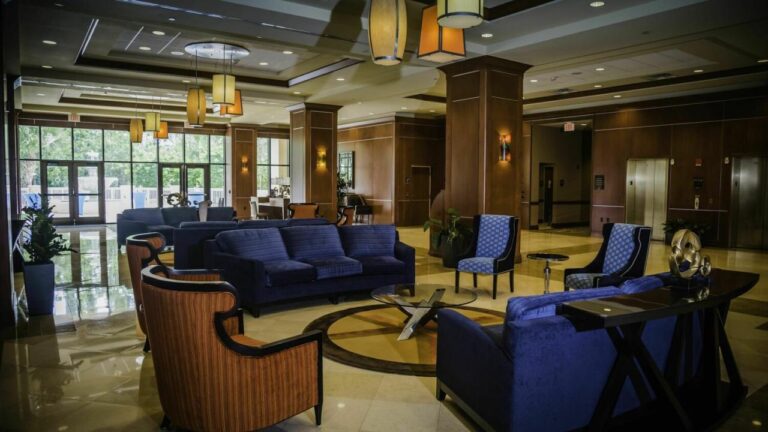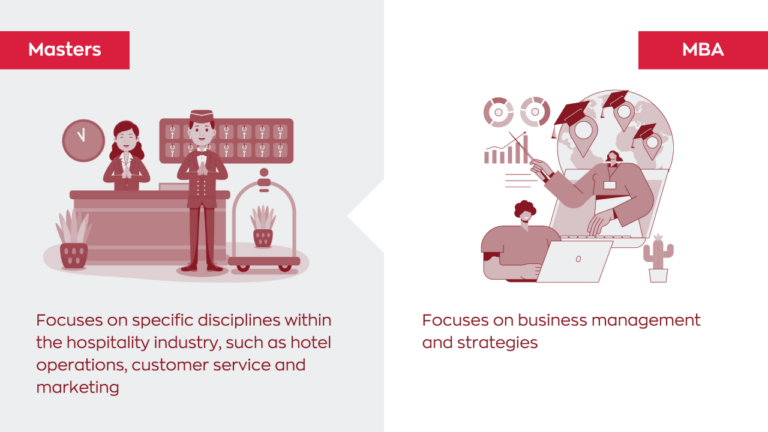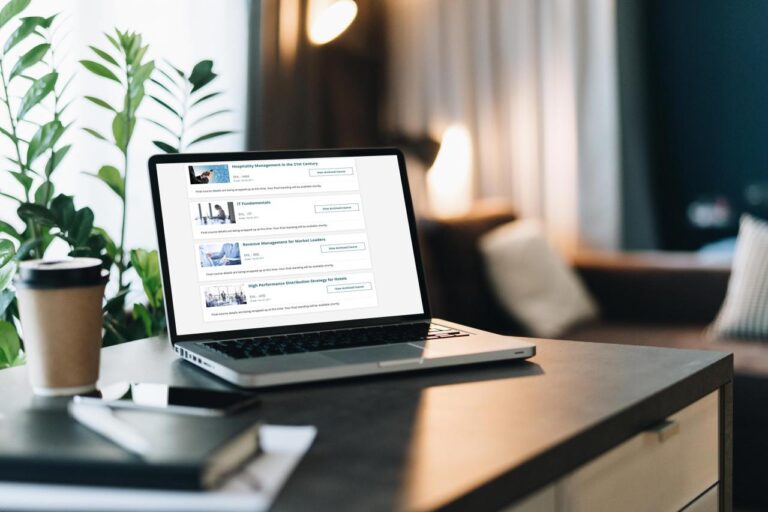Hotel Management Distance MBA A Comprehensive Guide
Hotel Management Distance MBA programs offer a flexible pathway to a rewarding career in the hospitality industry. This innovative approach allows aspiring managers to enhance their skills and knowledge while balancing professional commitments and personal lives. We will explore the curriculum, career prospects, and financial considerations associated with pursuing this increasingly popular degree option, providing a clear understanding of what to expect and how to best navigate this exciting educational journey.
This guide delves into the specifics of a Hotel Management Distance MBA, examining the program structure, admission processes, financial aid options, and career paths available to graduates. We’ll also discuss the role of technology in online learning and highlight strategies for effective networking and professional development. Our aim is to equip prospective students with the knowledge they need to make informed decisions about their future in the dynamic world of hotel management.
Program Overview

A distance learning MBA in Hotel Management offers a flexible and convenient pathway to a successful career in the hospitality industry. This program provides students with the essential business acumen and specialized hotel management knowledge needed to excel in various roles within the sector. It combines rigorous academic study with practical application, preparing graduates for leadership positions.
Typical Curriculum of a Hotel Management Distance MBA Program
The curriculum typically covers a range of core business subjects, such as accounting, finance, marketing, and operations management, alongside specialized hotel management modules. These specialized modules might include revenue management, hotel operations, human resource management in hospitality, food and beverage management, and hospitality law. Elective courses often allow students to tailor their studies to specific interests, such as sustainable tourism or luxury hotel management.
The program culminates in a capstone project or thesis, allowing students to apply their knowledge to a real-world problem or scenario within the hotel industry.
Comparison of Learning Methodologies: Online vs. Traditional Hotel Management MBA Programs
Online Hotel Management MBA programs utilize a variety of learning methodologies designed for asynchronous learning. These include online lectures, interactive simulations, virtual case studies, online discussions forums, and assignments submitted through learning management systems. Traditional programs, in contrast, rely heavily on in-person lectures, group projects, and on-campus networking opportunities. While online programs offer flexibility and accessibility, traditional programs provide a more immersive and collaborative learning environment.
Both approaches aim to develop the same core competencies, but their delivery methods differ significantly.
Career Advancement Opportunities for Graduates of a Hotel Management Distance MBA Program
Graduates of a distance learning Hotel Management MBA program are well-positioned for a variety of career advancements within the hospitality industry. Possible career paths include roles such as hotel manager, revenue manager, director of operations, food and beverage director, human resources manager, and even general manager. The program equips graduates with the skills to manage teams, make strategic decisions, and navigate the complexities of the hospitality business.
Many graduates also find opportunities in consulting, working with hotels to improve their efficiency and profitability. The flexibility of the online format allows students to pursue these opportunities while maintaining their current employment, facilitating career progression.
Specializations within a Hotel Management Distance MBA Program
Many programs offer specializations to allow students to focus their studies on particular areas of interest. Examples include: Luxury Hotel Management, focusing on high-end service and operations; Sustainable Tourism Management, concentrating on environmentally and socially responsible practices; Revenue Management, specializing in optimizing pricing strategies; and Hospitality Technology Management, focusing on the application of technology in hotel operations.
These specializations provide graduates with in-depth knowledge and skills in their chosen area, enhancing their career prospects.
Key Skills Gained Through a Hotel Management Distance MBA Program
The following table Artikels the key skills gained through a Hotel Management Distance MBA program, categorized for clarity:
| Management Skills | Financial Skills | Marketing & Sales Skills | Operational Skills |
|---|---|---|---|
| Leadership | Financial Analysis | Marketing Strategy | Revenue Management |
| Team Management | Budgeting | Sales Management | Supply Chain Management |
| Strategic Planning | Cost Control | Brand Management | Hotel Operations Management |
| Problem-Solving | Investment Analysis | Digital Marketing | Quality Control |
Admission Requirements and Application Process

Embarking on a journey towards a Distance MBA in Hotel Management requires careful consideration of the admission prerequisites and a clear understanding of the application procedure. This section details the typical requirements and steps involved in securing admission to such a program. Successful applicants demonstrate a commitment to the field and possess the necessary academic background and professional experience.
Admission requirements for a Distance MBA in Hotel Management vary slightly depending on the institution. However, common elements ensure a consistent level of preparedness among students. These requirements are designed to evaluate a candidate’s suitability for the rigorous demands of the program and their potential for success in the hospitality industry.
Typical Admission Requirements
Generally, prospective students will need a bachelor’s degree from an accredited institution, preferably with a strong academic record. Many programs also consider relevant work experience in the hospitality sector, demonstrating practical application of theoretical knowledge. A competitive GMAT or GRE score may be required, showcasing analytical and problem-solving abilities. Finally, a well-written application essay allows candidates to highlight their motivations, career aspirations, and suitability for the program.
Required Application Documents
The application process typically involves submitting several key documents. These documents provide the admissions committee with a comprehensive picture of the applicant’s qualifications and suitability for the program. Providing complete and accurate documentation is crucial for a smooth and efficient application process.
- Completed application form: This form usually requests personal information, educational background, and work experience details.
- Official transcripts from all previously attended colleges and universities: These transcripts verify academic records and earned degrees.
- Letters of recommendation: Typically two or three letters from professors, supervisors, or other professionals who can attest to the applicant’s abilities and character.
- Resume or curriculum vitae (CV): A detailed summary of the applicant’s educational background, work experience, and relevant skills.
- GMAT or GRE scores (if required): These standardized test scores assess analytical and quantitative skills.
- Statement of purpose or essay: A personal statement outlining the applicant’s reasons for pursuing the MBA, career goals, and how the program aligns with their aspirations.
Application Process Steps
The application process for a Distance MBA in Hotel Management typically follows a structured sequence of steps. Careful attention to each step ensures a successful and timely application. Prospective students should familiarize themselves with the specific requirements and deadlines of their chosen institution.
- Research and select a program: Carefully consider program curriculum, faculty expertise, and career services offered.
- Review admission requirements: Ensure you meet all eligibility criteria before beginning the application.
- Gather required documents: Collect official transcripts, letters of recommendation, and other necessary materials.
- Complete and submit the application form: Fill out the application form accurately and completely.
- Pay the application fee: Submit the required application fee as per the institution’s instructions.
- Submit all supporting documents: Ensure all required documents are submitted electronically or by mail according to the program’s guidelines.
- Follow up on application status: Check the application portal or contact the admissions office to inquire about the status of your application.
Step-by-Step Application Guide
To streamline the application process, prospective students can follow these steps:
- Research and Choose a Program: Identify programs that align with your career goals and learning style. Consider factors such as accreditation, curriculum, faculty expertise, and online learning platform.
- Check Eligibility Requirements: Carefully review the admission criteria, including academic qualifications, work experience requirements, and standardized test scores (if any).
- Prepare Required Documents: Gather all necessary documents, ensuring they are complete and accurately reflect your qualifications. Request official transcripts well in advance.
- Complete the Application Form: Fill out the application form meticulously, providing accurate and comprehensive information.
- Obtain Letters of Recommendation: Request letters of recommendation from individuals who can speak to your skills and potential. Provide them with sufficient time to complete the letters.
- Write a Compelling Statement of Purpose: Craft a well-written statement of purpose highlighting your motivations, career aspirations, and suitability for the program.
- Submit Your Application: Submit your completed application form and all supporting documents before the deadline.
- Track Your Application Status: Monitor the status of your application and contact the admissions office if necessary.
Application Checklist
Before submitting your application, use this checklist to ensure you have all the necessary components:
| Item | Completed? |
|---|---|
| Completed Application Form | ☐ |
| Official Transcripts | ☐ |
| Letters of Recommendation (Number Required) | ☐ |
| Resume/CV | ☐ |
| GMAT/GRE Scores (If Required) | ☐ |
| Statement of Purpose/Essay | ☐ |
| Application Fee Payment | ☐ |
Program Costs and Financial Aid
Pursuing a Hotel Management Distance MBA requires a significant financial commitment. Understanding the associated costs and available financial aid options is crucial for prospective students to make informed decisions about their education. This section details the typical expenses, funding sources, and various financial aid avenues available to help manage the costs of this valuable degree.
Tuition Fees and Associated Costs
Tuition fees for a Hotel Management Distance MBA program vary significantly depending on the institution, program length, and the specific curriculum. Factors such as the university’s reputation, location, and the program’s features (e.g., specialized software access, online learning platform features) all contribute to the overall cost. In addition to tuition, students should budget for other expenses, including technology costs (laptop, software, reliable internet access), books and materials, program fees (application fees, late fees, etc.), and potential travel expenses for any required on-campus components or networking events.
These additional costs can quickly add up, so careful planning and budgeting are essential. A realistic budget should encompass all potential expenses, ensuring a smooth and stress-free learning experience.
Sources of Financial Aid
Several sources of financial aid can help offset the cost of a Hotel Management Distance MBA. These include scholarships, grants, loans, and employer-sponsored tuition assistance programs. Each option has specific eligibility requirements and application processes, and it’s important for prospective students to explore all available avenues. Many universities have dedicated financial aid offices that can provide personalized guidance and support throughout the application process.
Proactive research and early planning are crucial to securing the necessary funding.
Scholarships and Grants
Many organizations offer scholarships and grants specifically for students pursuing graduate degrees in hospitality management. These awards are often based on academic merit, financial need, or demonstrated leadership qualities. Some scholarships are offered by universities themselves, while others are provided by industry associations, professional organizations, and private foundations. Applicants should thoroughly research and apply for as many relevant scholarships and grants as possible to maximize their chances of receiving financial assistance.
The application processes typically involve submitting transcripts, essays, letters of recommendation, and financial documentation.
Student Loan Options
Student loans are another common source of funding for graduate education. Several lenders offer different types of student loans, including federal loans (often with more favorable interest rates and repayment options) and private loans. It’s important to compare interest rates, repayment terms, and fees from various lenders before selecting a loan. Students should carefully consider the long-term implications of borrowing money for education and create a realistic repayment plan.
Understanding the terms and conditions of each loan is crucial to avoiding financial difficulties after graduation.
Cost Comparison of Hotel Management Distance MBA Programs
The following table compares the estimated costs of a Hotel Management Distance MBA program from three hypothetical universities. These figures are for illustrative purposes only and should not be considered definitive. Actual costs may vary depending on factors such as program length, individual course selections, and other associated fees.
| University | Tuition Fees (USD) | Technology Costs (USD) | Total Estimated Cost (USD) |
|---|---|---|---|
| University A | 30,000 | 2,000 | 32,000 |
| University B | 35,000 | 1,500 | 36,500 |
| University C | 40,000 | 2,500 | 42,500 |
Technology and Online Learning in Hotel Management

Our distance MBA in Hotel Management leverages technology to create a dynamic and engaging learning experience, mirroring the fast-paced and technologically advanced nature of the hospitality industry. This approach ensures students gain the necessary skills and knowledge to thrive in a competitive market. The program is designed to be accessible and flexible, allowing professionals to pursue their education without interrupting their careers.Technology plays a pivotal role in delivering and enhancing the learning experience within our distance Hotel Management MBA program.
It facilitates access to high-quality educational resources, promotes collaborative learning, and simulates real-world scenarios relevant to the hospitality industry. This integration of technology ensures that our graduates are equipped not only with theoretical knowledge but also with practical skills applicable to their future roles.
The Role of Technology in Distance Learning
Our program utilizes a Learning Management System (LMS) as the central hub for all course materials, assignments, and communication. This platform provides students with access to lectures, readings, interactive exercises, and assessments, all available 24/7. The LMS also facilitates interaction between students and instructors through discussion forums, video conferencing, and personalized feedback on assignments. Furthermore, simulations and virtual reality experiences are incorporated to provide practical, hands-on experience in various hotel management scenarios, such as managing hotel operations during peak season or handling customer service challenges.
This allows for a more immersive and engaging learning experience compared to traditional classroom-based learning.
Benefits and Challenges of Online Hotel Management Education
Online learning offers several advantages for students pursuing a Hotel Management MBA. The flexibility to study at their own pace and location is a major benefit, accommodating the busy schedules of working professionals. The accessibility of resources and the ability to learn through diverse media—videos, simulations, and interactive exercises—enhance the learning experience. However, challenges exist. Self-discipline and time management are crucial for success in online learning.
The lack of face-to-face interaction can sometimes hinder collaboration and the development of strong interpersonal skills, which are essential in the hospitality industry. Overcoming this requires proactive participation in online discussions and collaborative projects.
Examples of Online Learning Platforms and Tools
Our program utilizes a variety of platforms and tools to support the online learning experience. The core platform is a sophisticated Learning Management System (LMS) similar to Canvas or Moodle, offering features such as course management, assignment submission, grading, and communication tools. Video conferencing software, like Zoom or Microsoft Teams, is integrated for live lectures, workshops, and virtual office hours.
Specialized hotel management software simulations provide practical training in areas such as revenue management and property management systems. Finally, collaborative tools such as Google Workspace or Microsoft 365 facilitate group projects and communication among students.
Comparison of Online Learning Methodologies
Our program incorporates a blended learning approach, combining asynchronous and synchronous learning methodologies. Asynchronous learning allows students to access materials and complete assignments at their own pace, while synchronous learning involves real-time interaction through live lectures, workshops, and online discussions. This blended approach balances flexibility with the benefits of real-time interaction and collaboration. Other methodologies, such as project-based learning and case study analysis, are also incorporated to ensure a holistic and practical learning experience.
The choice of methodology is tailored to specific course objectives and learning outcomes.
Advantages and Disadvantages of Online Learning
| Advantages | Disadvantages |
|---|---|
| Flexibility and convenience: Study anytime, anywhere. | Requires self-discipline and time management skills. |
| Accessibility to a wider range of resources. | Limited face-to-face interaction with instructors and peers. |
| Cost-effective compared to traditional programs. | Potential for technical difficulties and lack of access to technology. |
| Personalized learning experience tailored to individual needs. | Difficulty in maintaining motivation and focus without direct supervision. |
Networking and Professional Development: Hotel Management Distance MBA
A strong professional network and ongoing commitment to professional development are crucial for success in the competitive hospitality industry. Our Hotel Management Distance MBA program actively fosters these elements, providing numerous opportunities to connect with peers, industry leaders, and potential employers. Graduates will be well-equipped to navigate the dynamic landscape of the hospitality sector and advance their careers.
Networking Opportunities for Distance Learners
Our program offers several avenues for building a professional network, even within a distance learning format. These include online forums and discussion boards where students can interact with peers and faculty, fostering collaborative learning and professional relationships. Virtual networking events and webinars provide opportunities to connect with industry professionals and alumni. Furthermore, access to an online alumni directory allows students to connect with graduates working in various sectors of the hospitality industry, gaining valuable insights and mentorship opportunities.
Finally, participation in online group projects encourages teamwork and the development of professional relationships.
Importance of Professional Development in Hotel Management
Professional development is essential for Hotel Management MBA graduates to remain competitive and adaptable in a constantly evolving industry. The hospitality sector demands continuous learning and the adoption of new technologies and management strategies. Professional development ensures graduates possess the latest skills and knowledge, enabling them to excel in their roles and pursue advanced career opportunities. This includes staying abreast of industry trends, developing strong leadership qualities, and mastering new technologies relevant to hotel operations and management.
Continuous learning demonstrates a commitment to professional growth, making graduates more attractive to potential employers.
Relevant Professional Organizations and Associations
Several professional organizations and associations provide valuable resources and networking opportunities for hospitality professionals. Examples include the American Hotel & Lodging Association (AHLA), which offers educational resources, industry news, and networking events; the Hospitality Sales & Marketing Association International (HSMAI), focusing on sales, marketing, and revenue management; and the International Hotel & Restaurant Association (IH&RA), a global organization representing the interests of the hospitality industry.
Membership in these organizations offers access to industry conferences, publications, and networking events, significantly enhancing professional development. These organizations also provide opportunities for certification and professional recognition.
Strategies for Building a Professional Network During the Program
Building a professional network while pursuing a distance MBA requires proactive engagement. Actively participate in online discussions and forums, demonstrating expertise and engaging with peers. Attend virtual networking events and webinars, preparing thoughtful questions and engaging in meaningful conversations. Connect with alumni through the online directory, seeking mentorship or informational interviews. Leverage social media platforms like LinkedIn to connect with professionals in the hospitality industry, sharing relevant content and engaging in industry discussions.
Finally, actively participate in group projects, fostering strong relationships with fellow students who may become future colleagues.
Plan for Building a Professional Network
A structured approach to networking is crucial. This plan Artikels key steps and activities.
- Initial Assessment: Identify personal career goals and desired network connections.
- Platform Selection: Choose appropriate online platforms (LinkedIn, industry-specific forums) to engage.
- Profile Optimization: Create a professional online profile showcasing skills and experience.
- Active Participation: Engage in online discussions, share insights, and ask relevant questions.
- Networking Events: Attend virtual events, preparing questions and engaging in meaningful conversations.
- Mentorship Seeking: Connect with alumni and professionals for guidance and support.
- Informational Interviews: Schedule brief conversations with professionals to learn about their career paths.
- Relationship Building: Maintain consistent contact with valuable network connections.
- Continuous Learning: Stay updated on industry trends and share relevant information.
- Reciprocity: Offer support and assistance to others in your network.
Summary
Pursuing a Hotel Management Distance MBA presents a compelling opportunity for career advancement and professional growth in the hospitality sector. By understanding the program structure, admission requirements, financial implications, and career prospects, prospective students can confidently embark on this enriching educational journey. The flexibility of online learning combined with the industry-relevant curriculum equips graduates with the necessary skills and knowledge to excel in various roles within the hospitality industry, leading to fulfilling and successful careers.
FAQ Insights
What are the prerequisites for a Hotel Management Distance MBA?
Prerequisites vary by institution but typically include a bachelor’s degree, relevant work experience (sometimes), and satisfactory GMAT or GRE scores.
How long does a Hotel Management Distance MBA program typically take to complete?
The duration usually ranges from 18 to 24 months, depending on the program’s structure and the student’s pace.
Are there any on-campus requirements for a distance MBA program?
While primarily online, some programs may require short on-campus residencies for networking events or specialized workshops.
What is the average salary for a Hotel Management MBA graduate?
Salaries vary significantly based on experience, location, and job role, but graduates often command competitive salaries in the hospitality industry.
What types of technology are used in online Hotel Management MBA programs?
Common technologies include Learning Management Systems (LMS), video conferencing software, online collaboration tools, and specialized hospitality industry software simulations.





